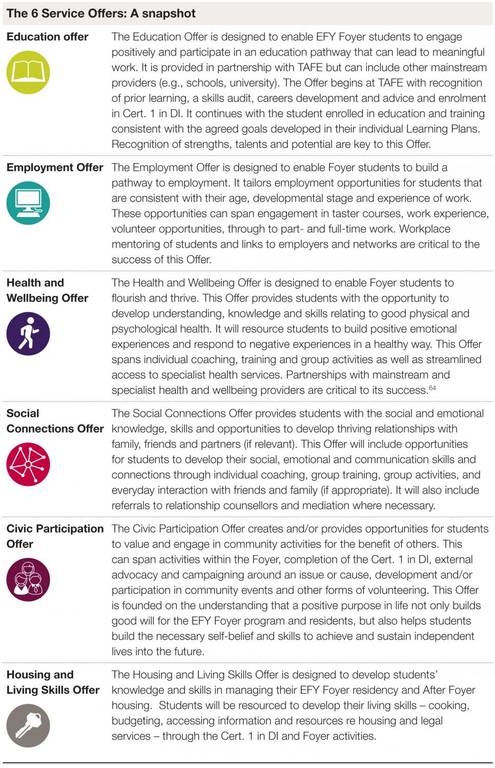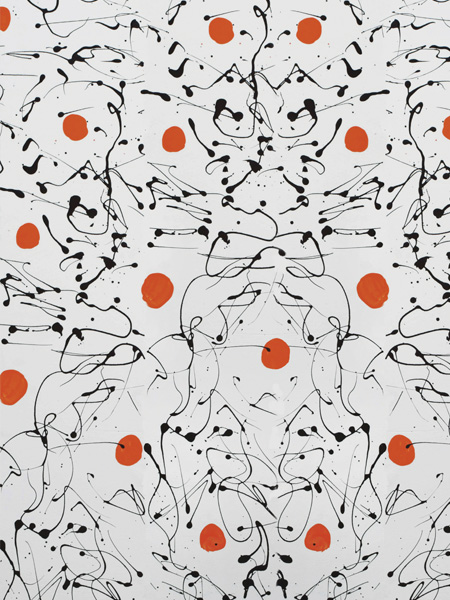The 6 Service Offers

The 6 Service Offers – Education, Employment, Health and Wellbeing, Social Connections, Civic Participation, and Housing and Living Skills – are critical to the Model. The inclusion and development of these 6 Offers is grounded in research and practice evidence that highlights the role of these domains in facilitating young people’s successful transition to adulthood.
Education
Education is at the heart of the Offers as we know that early school leavers experience social exclusion at three times the rate of those who have completed Year 12.51 In addition, research has shown that:
People who had experienced homelessness in the last 10 years reported lower levels of educational attainment. After standardising for age, of adults who had been homeless, one third (33%) had not gone beyond Year 10 at school nor obtained a non-school qualification above Certificate II level, compared with 23% of those who had never been homeless. 52
Employment
The 1989 HREOC path-breaking report on youth homelessness found that ‘unemployment was a cause of youth homelessness in two ways. First unemployment was a factor in family conflict and the decision to leave home. Second, unemployed young people could not afford adequate accommodation due to inadequate income’.53
As many have noted, homeless young people have particular difficulty accessing the labour market even when there are semi-skilled jobs available. Youth employment policy and programs underestimate ‘the issues that many young homeless young people face and the effort required to overcome them’. It is clear that ‘major reform is needed to link education, training and employment program with accommodation and other supports’.54
Health and Wellbeing
Health and Wellbeing is foregrounded as we know that this is critical to education and employment pathways. For Johanna Wyn, Director of the Youth Research Centre at the University of Melbourne:
… education and health systems are most closely associated with young people’s wellbeing, along with families and young people themselves, neither system ‘owns’ wellbeing. Because neither system provides a basis for a systematic approach to young people’s wellbeing, young people’s wellbeing slips through. It is lost somewhere in between, an individual responsibility of young people and their families. 55
Through the Health and Wellbeing Offer, Foyer aims to develop positive health and wellbeing practices for students and to prioritise wellbeing as an over-arching, coordinated part of the Offers.
Social Connections
Relationships with people who value and support you are known to have a positive effect on wellbeing. These relationships build self-esteem and motivation to engage with others and the broader community. The Social Connections Offer builds students’ social networks, including those that enhance their social capital and enable them to connect to the community and access employment and other opportunities.
Three dimensions of social capital are commonly distinguished – bonding, bridging and linking. Bonding social capital refers to social networks founded on trust and reciprocity with a community of people who are similar (e.g., family, friends). Bridging social networks refer to social relationships established across diverse communities (e.g., EFY Foyer students engaged with local youth sporting team). Linking social capital refers to relationships or social connections between individuals and institutions of authority (students and employer). All three are important for the construction of a civil society and individual health and wellbeing: bonding social capital builds social support and solidarity, and bridging and linking for providing resources, opportunities and links to institutions and systems that aid ‘getting ahead’.56 EFY Foyers aim to develop all three.
Civic Participation
Positive purpose is fostered through engagement in community activities for the benefit of others. This is one of the most important factors for good health and wellbeing.57 It provides people with a central mission or vision for life and a sense of directedness.58 Having purpose has been linked with positive physical and psychological health outcomes including:
- greater life satisfaction59
- higher self-esteem, optimism and positive emotion60
- resilience, coping and grit.61
Housing and Living Skills
Stable Housing is crucial for health and wellbeing.62 This is evidenced by research that examines the negative health impacts that precarious housing can have on both physical and mental health. The key elements of inadequate housing that affect health are:
- inadequate housing hardware and amenity, such as poor quality housing (e.g., leaking, damp, etc.) unsafe (e.g., low security, inadequate wiring)
- inadequate space, where household’s capacity to control or contain what occurs in the living is restricted (e.g., overcrowded)
- poor location, due to unsafe or under-resourced neighborhood or location that restricts the household or person’s access to social connections
- unaffordable housing
- insecure tenure.
As such, the provision of adequate housing can then be considered a preventative heath intervention.63 And developing the skills to access and sustain adequate housing, in addition to maximising the education and training opportunities that have the potential to increase earnings, will limit the ill-effects of precarious housing.

Purpose of the 6 Service Offers
Through their engagement with these 6 Offers, EFY Foyer students will:
- develop their talents, skills and qualifications to further their personal goals and build the foundations for a sustainable livelihood
- accumulate an Address Book of contacts and networks that builds their social capital and social connection
- develop the understanding, skills and capacities to thrive.
Although interconnected, each of the 6 Service Offers develops the skills of students supported by an approach with clearly articulated goals, training, activities, opportunities, networks and resources. Students can access, engage in, develop and tailor these Offers to suit their needs and aspirations over their time in both the Foyer and After Foyer phases.
Of the 6 Offers the Education Offer is pivotal to the overall success of the Model, as it determines how the Model is constructed and delivered from the Pre-Foyer to After Foyer phases. The key driver for the Education Offer is a purpose-built Certificate I in Developing Independence (hereafter Cert. I in DI). From the moment students enter the EFY Foyer they engage in the Cert. I in DI and develop a personal Learning Plan that maps out their engagement and pathway in relation to each of the 6 Service Offers.
The Cert. I in Developing Independence aims to provide a launch-pad from which to engage with the 6 Service Offers.
Education First – Cert. I in Developing Independence
The Cert. I in DI is a mandatory course, formally accredited by the Victorian Registration and Qualifications Authority, in which students accepted into the EFY Foyer will enrol on their second day of induction. The first step towards gaining this qualification is undertaken during the assessment phase when young people complete the Recognition of Informal Learning interview with TAFE staff. Following this interview, which takes account of the young person’s strengths and prior learning, they receive a Certificate of Recognition of Informal Learning or CRIL.
This course was specifically developed in response to the identified need for an accredited, introductory program for young people participating in community youth
support programs such as the Youth Foyer initiative highlighted in evaluations of similar programs operating in the United Kingdom and Europe.
These studies emphasised the need for foundational programs, such as the Cert. I in DI, that assist young people unable to live at home to:
- Develop the confidence and capabilities required to successfully re-engage with education, training and employment
- Build the skills, sense of self-worth and personal vision needed to sustain participation in community youth support programs, such as the Education First Youth Foyer or similar programs
- Develop personal goals, attain basic employment-related skills and achieve the fundamental competencies required for participation in learning environments, social groups, teams, work groups and community life.
The Cert. I in Developing Independence aims to provide a launch-pad from which to engage with the 6 Service Offers of the EFY Foyer program, thereby assisting young people to reconnect with employment, education and training systems, and the broader community.
Each of the 6 Service Offers – Education, Employment, Health and Wellbeing, Social Connections, Civic Participation, and Housing and Living Skills – invests in training, activities, opportunities, networks and resources that are flexibly delivered and tailored to each student's needs and aspirations.


Artwork title: Abstract
Artist: Saphire Thomas
Orange is for passion… the abstract was to put a bit of feeling and emotion into it